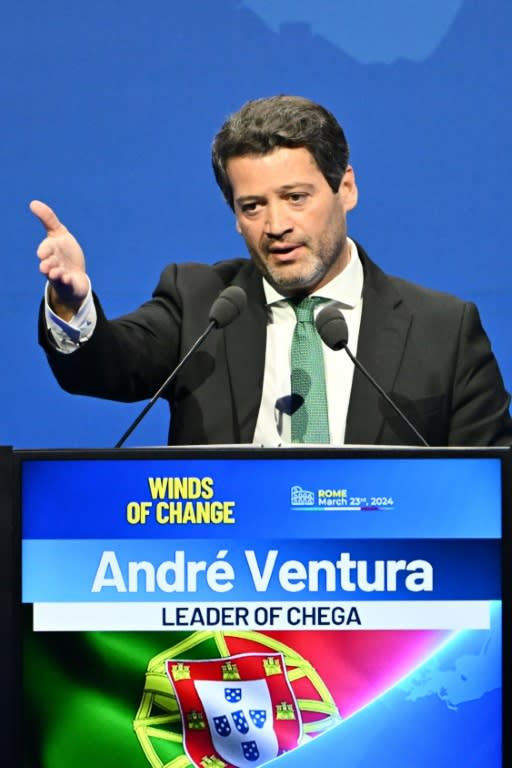Portugal marks 50 years of democracy with far right on the rise

Portugal on Thursday marked 50 years since a military coup ended a decades-long dictatorship and 13 years of African colonial wars, with the anniversary marked by the rising prominence of a far-right party.
The half-century of the Carnation Revolution -- named after the flowers protesters placed in soldiers' guns during the peaceful uprising -- comes a month after the far-right party Chega more than quadrupled its seats in parliament, cementing its position as Portugal's third-largest party.
The celebrations began with a military ceremony on Lisbon's central square beside the Tagus River.
It will conclude with a meeting between Portugal's conservative President Marcelo Rebelo de Sousa and his counterparts from former colonies Angola, Mozambique, Guinea-Bissau, Cape Verde and Sao Tome and Principe.
In a surprise statement, Rebelo de Sousa this week raised the possibility that Portugal could pay reparations to its former colonies.
"We are responsible for what we did there... we have to pay the cost," he told foreign journalists on Tuesday, citing "unacceptable historic behaviour".
He did not give details of how this should be done -- and his position is not backed by the centre-right government that took power after last month's elections.
An unnamed government source was quoted by news weekly Expresso on Wednesday as saying that the subject of reparations was seen as "toxic" and "inappropriate".
At the "solemn session" organised Thursday in parliament, the president did not mention his suggestion, which was heavily criticised by the far right.
- 'Proud of this country's history' -
Chega's leader Andre Ventura accused the president of having "betrayed the Portuguese".
"Pay what? Pay to whom? I am proud of this country's history," he added.
According to a survey published last week, half of the respondents said the former regime had more negative aspects than positive, but a fifth said the opposite.
And about two-thirds -- or 65 percent -- said the Carnation Revolution was the most important event in Portugal's history, more than the end of its monarchy in 1910 or its 1986 accession to what would become the European Union.
"The main motivation was to resolve the problem of the colonial wars" that had been going on for 13 years in Angola, and almost as long in Mozambique and Guinea-Bissau, said retired colonel Vasco Lourenco.
As a young officer, he said it took almost a year to put together the "conspiracy" to carry out "a coup d'etat aimed at opening the way to freedom, putting an end to the wars and building democracy in Portugal", he told AFP.
Attending Thursday's military parade was pensioner Manuel Lima who spoke of the importance of the revolution to him.
"I was 20 and April 25 saved me from being sent to war," he said, filled with emotion.
On April 25, 1974, what at the time was the oldest authoritarian regime in Western Europe fell within a matter of hours, virtually without bloodshed, thanks to an uprising by non-commissioned officers that was immediately backed by the public.
The coup paved the way for the country's first free elections based on universal suffrage on April 25, 1975, as well as the independence for Portugal's remaining African colonies.
- 'A lot of heroism' -
Lourenco, one of the officers who took part in the coup, now heads the April 25 Association that represents putschist soldiers.
"It was mainly the pictures taken on that day that transformed the red carnation into a symbol of the April 25th Revolution, giving a romantic, poetic vision to an act that had a lot to do with heroism -- even though the revolution was particularly peaceful," historian Maria Inacia Rezola, a historian who is overseeing the anniversary celebrations, said.
Portugal's dictatorship years began in 1926, consolidated under Prime Minister Antonio de Oliveira Salazar and continued from 1968 by his successor Marcelo Caetano.
Many Portuguese believed the country's authoritarian past would offer it some protection from the rise of the far right, which has been seen elsewhere in Europe, but the breakthrough by Chega in a general election last month has dampened this view.
While its founder and leader Ventura has criticised the dictatorship years, Chega ("Enough") has used the slogan "God, Homeland, Family, Work" -- an echo of the Salazar dictatorship's "God, Homeland, Family".
Set up in 2019, Chega promises tougher law and order, stricter immigration measures, and chemical castration for paedophiles.
It is the first hard-right party to gain ground in Portugal since the end of the dictatorship.
During the dictatorship Portugal remained "a poor, backward, illiterate country isolated from the rest of the world", Rezola said.
"I thought that 48 years of dictatorship would have made the country immune to this wave of populism and radical far-right movements, but the reality turned out to be different," she added.
tsc/ds/rlp/yad/nmc/gv

 Yahoo News
Yahoo News 